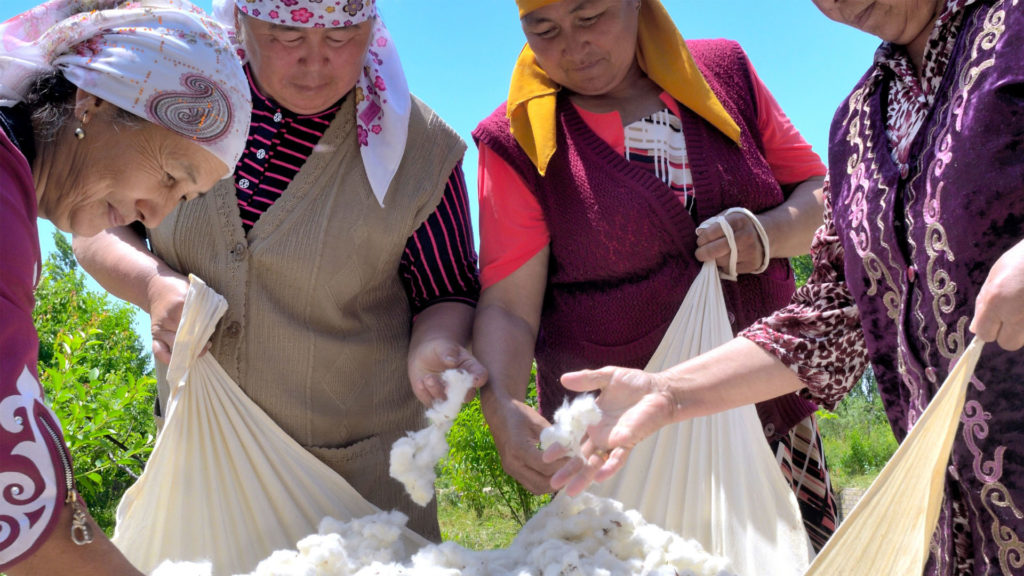Feel good about your fashion by choosing eco-friendly outfits that benefit the people who make our clothes and limit our impact on the planet’s resources.
Choose the world you want. Choose Fairtrade
If you’re thinking about updating your virtual office wardrobe to reflect the fresher autumnal weather and the days drawing in, now’s the time you can make a real difference to farmers and workers most affected by the COVID-19 pandemic in the Global South.
Since the start of the coronavirus crisis, many of the pandemic’s hardships have fallen on the most vulnerable members of the fashion supply chain: the cotton farmers and workers. Research shows that clothes are among the items most at risk of being produced through modern slavery in an industry where women make up 80% of the global workforce.
Reference: Fashion is one of the key industries contributing to modern slavery
Forced and child labour is particularly prominent on cotton farms at planting and harvesting times. Due to the coronavirus pandemic, women and children have less protection than ever.
A new report by the Fairtrade Foundation reveals that shopping more ethically – buying less and buying better, is more important than ever. That means choosing fabrics less damaging to the planet, made in factories that are safe, have better eco-credentials and pay fair wages to their employees.
Read Fairtrade’s Cotton Commodity Briefing (pdf)
Fairtrade’s Cotton Commodity Briefing is published to coincide with World Cotton Day, on October 7th 2020, and warns that cotton was already failing to provide a sustainable and profitable livelihood for the millions of small-scale seed cotton farmers, predominantly in Asia and Africa. The global cotton textile industry depends on them, yet many live below the poverty line and are reliant on the ginners who buy their cotton, often at prices below the cost of production.
Fairtrade’s report shows that a typical cotton farmer earns just 70p per t-shirt sold (calculation based on the cost of a £15 average t-shirt).
Rising farm costs, fluctuating market prices, decreasing yields and climate change are daily challenges for producers, along with food price inflation and food insecurity. These factors affect farmers’ ability to provide decent wages and conditions for the casual workers they employ. A small fall in world cotton prices can have serious implications for a farmer’s ability to meet these needs. The ICAC has forecast that global consumption of cotton will drop approximately 12% this year due to the impact of COVID-19, and global cotton prices are predicted to fall by 22% (UNCTAD).
Subindu Garkhel, Fairtrade’s Senior Cotton and Textile Lead, said: ‘It is always the most vulnerable, lowest paid people in the fashion supply chain that are worst hit by shocks. Now is the time to build back better and pick sustainable fashion labels that directly boost the incomes of farmers and workers who make them.
‘Fairtrade is unique because it is the only certification scheme whose primary aim is to tackle poverty through better terms of trade, as well as giving farmers greater power within their trading relationships.’
Fairtrade’s new report shows that consumers and the fashion industry are increasingly concerned about the challenges in the cotton sector. Today there are more than 70 certification schemes that aim to improve the economic, social and environmental conditions for producers. As a result, sustainable cotton grew overall to make up 21% of global production in the 2017/18 season. But picking the right label can be a bit of a minefield, so it’s worth checking carefully what each scheme or logo actually stands for.
Fairtrade is the best buy for tackling poverty and empowering farmers through the supply chain, whilst protecting our planet. Fairtrade’s report shows that we also look at externalities, the combined social and environmental costs of Fairtrade cotton farming are five times lower than that of conventional cotton farming.
‘We support farmers with fair, stable prices and additional income to invest in infrastructure, training, farm equipment and business improvements, as well as healthcare, clean water and education programmes that contribute to flourishing communities.
‘We also help farmers manage the environmental, climate and health risks from cotton production and train them to build stronger organisations with increased bargaining power and a more active role in global supply chains,’ Garkhel continued.
Fairtrade pays Minimum Prices to farmers, which deliver higher returns than market prices. In addition, Fairtrade Premium received by the co-operative benefits local communities by enabling them to fund projects to enhance their wellbeing.
Fairtrade works with 19 producer organisations growing Fairtrade cotton in seven countries. In 2018, cotton farmers generated €1,434,146 of Fairtrade Premium. 18 per cent of this Premium was spent on community services, including education, and 47 per cent on agricultural tools and inputs.
-Ends –
For more information, interviews and images, contact Martine Parry Tel: 07886 301486 martine.parry@fairtrade.org.uk
